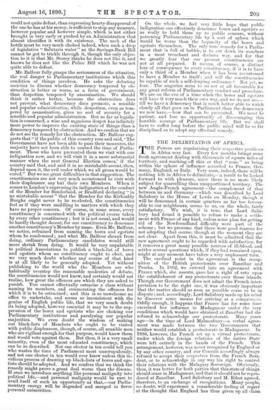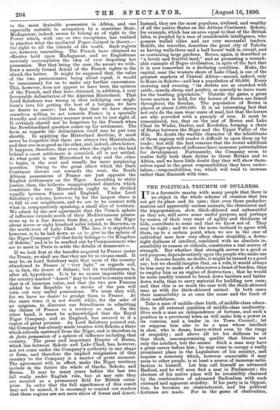THE DELIMITATION OF AFRICA. T HE Powers are regularising their respective
positions in Africa very fast. Every few months brings some fresh agreement dealing with thousands of square miles of territory, and marking off this or that " zone " as being within the sphere of influence accorded to France, Ger- many, England, or Italy. Very soon, indeed, there will be nothing left in Africa to delimitate,—a result to be looked forward to with pleasure, since there is no more likely subject for quarrelling than unapportioned territory. The new Anglo-French agreement—the complement of that between us and Germany—which was described by Lord Salisbury in the House of Lords on Monday, though it will be denounced in certain quarters as far too favour- able to our neighbours, seems to us, on the whole, fairly satisfactory. We wish, it is true, that Lord Salis- bury had found it possible to refuse to make a settle- ment with France of any kind, unless some plan for getting rid of the Newfoundland difficulty were part of the scheme ; but we presume that there were good reasons for not adopting that course, though at the moment they are not clear. Apart from this, it must be admitted that the new agreement ought to be regarded with satisfaction, for it removes a great many possible sources of ill-blood, and settles several questions which, if they had remained open, might at any moment have taken a very unpleasant turn.
The cardinal point in the agreement is the recog- nition of the British protectorate over Zanzibar and Pemba. In 1862, we entered into an agreement with France which, she asserts, gave her a right of veto upon the establishment of any protectorate over those islands. Though our Government does not admit the French inter- pretation to be the right one, it was obviously important that the matter should as soon as possible cease to be in dispute ; and, accordingly, Lord Salisbury made up his mind to discover some means for arriving at a compromise. Oddly enough, it happens that France has for some time exercised her influence in Madagascar under the very conditions which would have obtained at Zanzibar had she refused to acknowledge our protectorate. Many years ago—in the time of Lord Malmesbury—a verbal agree- ment was made between the two Governments that neither would establish a protectorate in Madagascar. In 1886, however, the French set up a virtual protectorate, under which the foreign relations of the native State were left entirely in the hands of the French. This arrangement, however, was never recognised by England or by any other country, and our Consuls accordingly always refused to accept their exequaturs from the French Resi- dent, or to acknowledge in any way his right to control their relations with the Malagasy Sovereign. Obviously, then, it was better for both parties that this state of things should cease in Madagascar, and that it should not be repro- duced at Zanzibar. Lord Salisbury and M. Ribot agreed, • therefore, to an exchange of recognitions. Many people; no doubt, will experience a considerable feeling of regret at the thought that England has thus given up all claim to the most desirable possession in Africa, and one especially suitable to occupation by a maritime State. Madagascar, indeed, seems to belong as of right to the Power which, with one or two exceptions, has realised in practice what the mediaeval Popes claimed in theory,— the right to all the islands of the world. Such regrets are, however, unavailing. The French have obtained an effective hold upon Madagascar, and no Englishman seriously contemplates the idea of ever disputing her possession. But that being the case, the sooner we with- draw a merely formal denial of the French rights in the island, the better. It might be supposed that, the value of the two protectorates being about equal, it would be unnecessary for us to make any further concessions. This, however, does not appear to have been the opinion of the French, and they have obtained, in addition, a very favourable delimitation of the Algerian Hinterland. That Lord Salisbury was wrong in thus indulging our neigh- bour's love for getting the best of a bargain, we have no desire to assert ; but the fact that we have shown ourselves willing to act towards France in a specially friendly and conciliatory manner must not be lost sight of. It certainly should not be forgotten by the French when the Newfoundland question comes up for settlement. The facts as regards the delimitation itself may be put very shortly. In applying the Hinterland doctrine, it must never be forgotten that there are always two Hinterlands, and that one is as good as the other, and, indeed, often better. It happens, therefore, that even when the right to the land behind a coast settlement is conceded, all is not settled. At what point is one Hinterland to stop and the other to begin, is the next and usually far more perplexing question. Owing to the great elbow which the Dark Continent throws out towards the west, the North African possessions of France are just opposite the English settlements on the Niger. According to strict justice, then, the hitherto unappropriated districts which constitute the two Hinterlands ought to be divided equally between France and England. Under Lord Salisbury's scheme, however, by far the largest share is to fall to our neighbours, and we are to be content with what is, comparatively speaking, a small slice of territory. We admit by the new agreement that the French sphere of influence extends south of their Mediterranean posses- sions up to a line drawn from Say, a post on the Niger about seven or eight hundred miles inland, to Barruwa, on the north-west of Lake Chad. The line, it is stipulated, however, is to be laid down so as to give to the sphere of the Niger Company "all that fairly belongs to the Kingdom of Sokoto," and is to be marked out by Commissioners who are to meet in Paris to settle the details of demarcation.
If we look first at the benefits acquired by France under the Treaty, we shall see that they are by no means small. It may be, as Lord Salisbury says, that most of the country -abandoned to France is " very light " as regards soil, is, in fact, the desert of Sahara ; but its worthlessness is, after all, hypothesis. It is by no means impossible that the country marked " desert " may be found to contain much that is of immense value, and that the two new Frances .added to the Republic by a stroke of the pen will turn out very useful possessions. We trust they will, for we have no desire to grudge them to France. At the same time, it is not worth while, for the sake of an epigram, to discount our friendliness in admitting the claims of France to a territory so vast. On the other hand, it must be acknowledged that the Royal Niger Company, and so England, has secured to it a region of great promise. As Lord Salisbury pointed out, the Company has already made treaties with Sokoto, a State 'which extends eastward from the Niger, and is therefore in .de facto possession of a sphere of influence including that .country. The great and important Empire of Bornu, which lies between Sokoto and Lake Chad, has, however, not yet come under the Company's authority in any shape or form, and therefore the implied resignation of that country to the Company is a matter of great moment. The agreement will, in effect, make the Niger territory include in the future the whole of Gardo, Sokoto, and Bornu. It may be many years before the last two fall really under English rule, but at any rate they are secured as a permanent field for British enter- prise. In order that the full significance of this result may not be missed, it is necessary to remind our readers that these regions are not mere slices of forest and desert. Instead, they are the most populous, civilised, and wealthy of all the native States on the African Continent. Sokoto, for example, which has an area equal to that of the British Isles, is peopled by a race of considerable intelligence, who possess walled cities and are very successful traders. Rohlfs, the traveller, describes the great city of Yakoba as having walls three and a half hours' walk in circuit, and as containing large gardens. Bornu, again, is described as "a lovely and fruitful land," and as presenting a remark- able example of Negro civilisation, in spite of the fact that it is now somewhat in a declining condition. Kuka, the capital, near the western shore of Lake Chad, is one of the greatest markets of Central Africa—second, indeed, only to Kano in Sokoto—and has a population of 60,000. Every morning and evening, " its streets are so crowded with cattle, camels, sheep, and poultry, as scarcely to leave room for the bustling population." Outside the gates, a great horse auction is held, for the horses of Bornu are famed throughout the Soudan. The population of Bornu is placed at about 5,000,000. It is an interesting fact that not only do the men wear coats of mail, but that the horses are also provided with a panoply of iron. It must be remembered, too, that on the east of Bornu and Lake Chad lie Wadai, Darfur, and Kordofan, forming a chain of States between the Niger and the Upper Valley of the Nile. No doubt the warlike character of the inhabitants of these regions will render it difficult to open them up by trade ; but still the fact remains that the recent additions to the Niger sphere of influence have immense potentialities for development. Fortunately, the Company seem to realise fully both their duties to Great Britain and to Africa, and we have little doubt that they will show them- selves equal to the great responsibilities they have under- taken,—responsibilities, too, which will tend to increase rather than diminish with time.



































 Previous page
Previous page